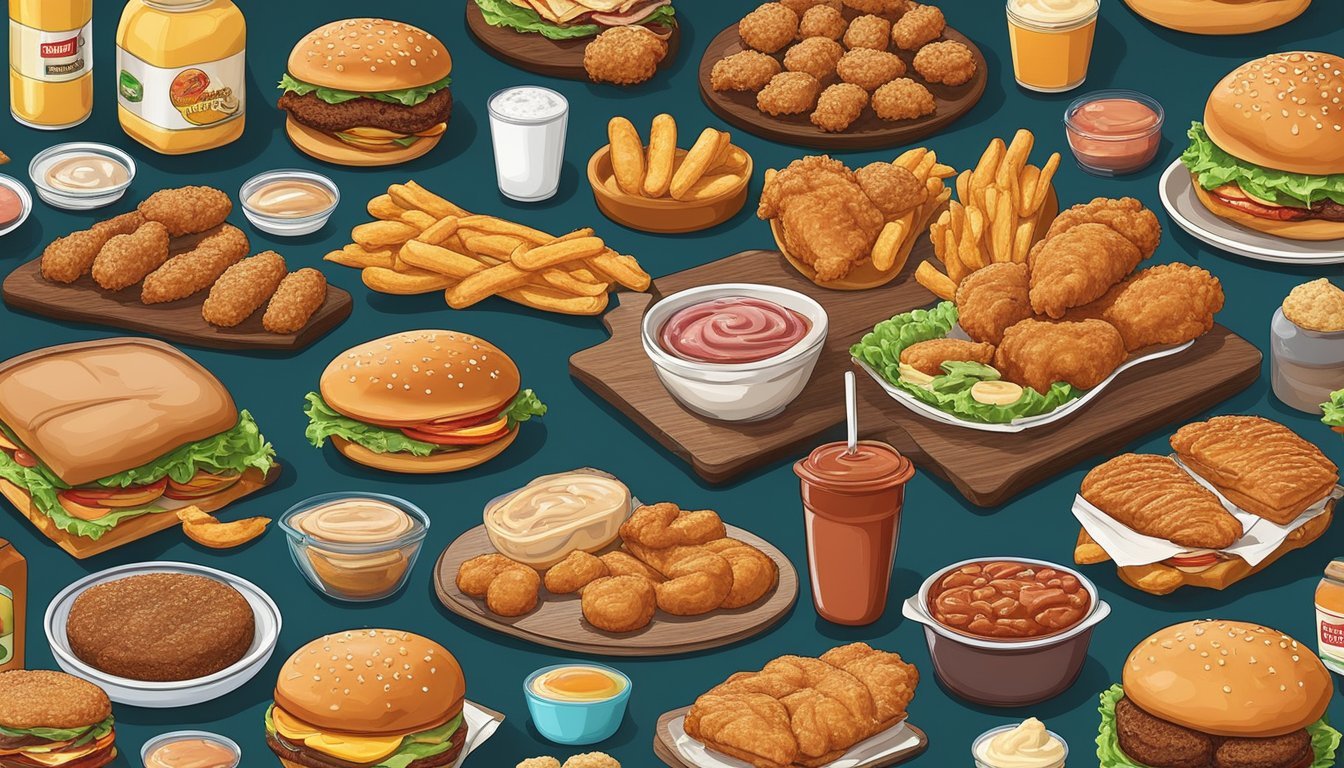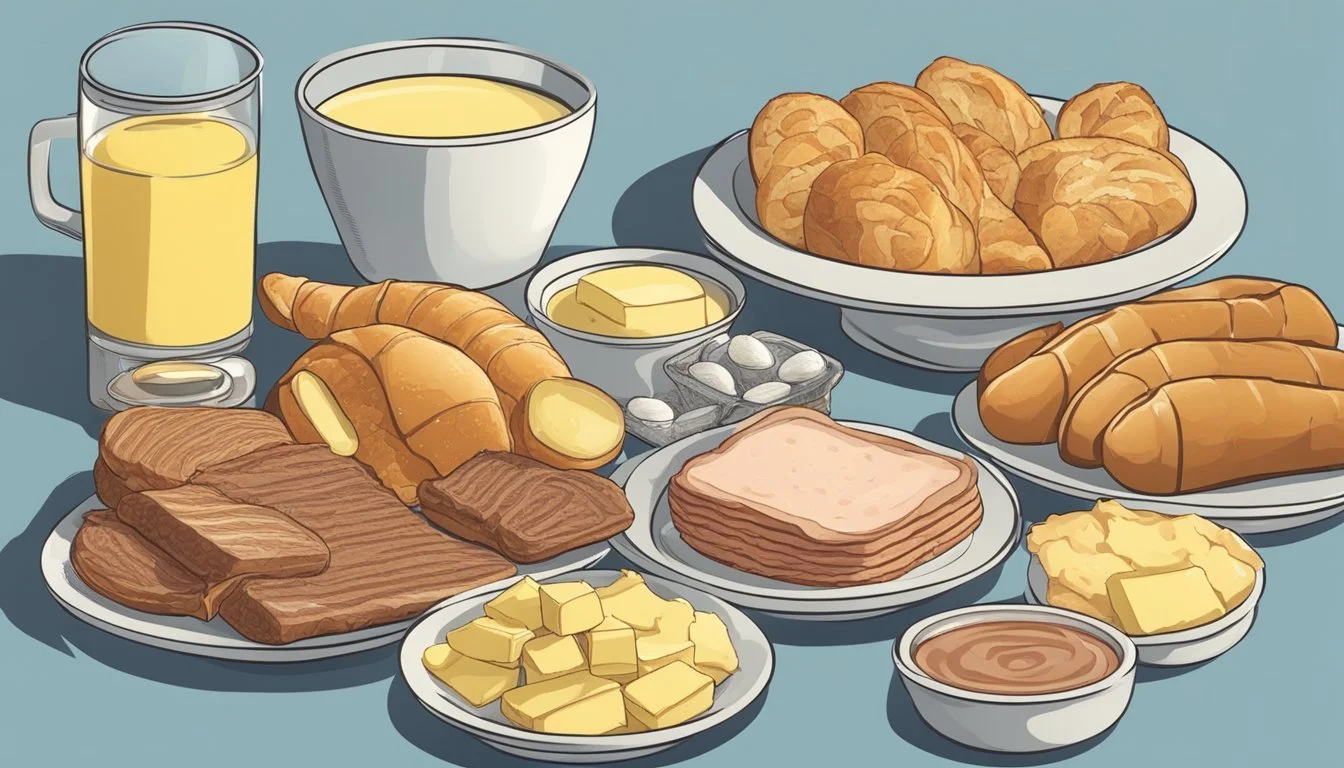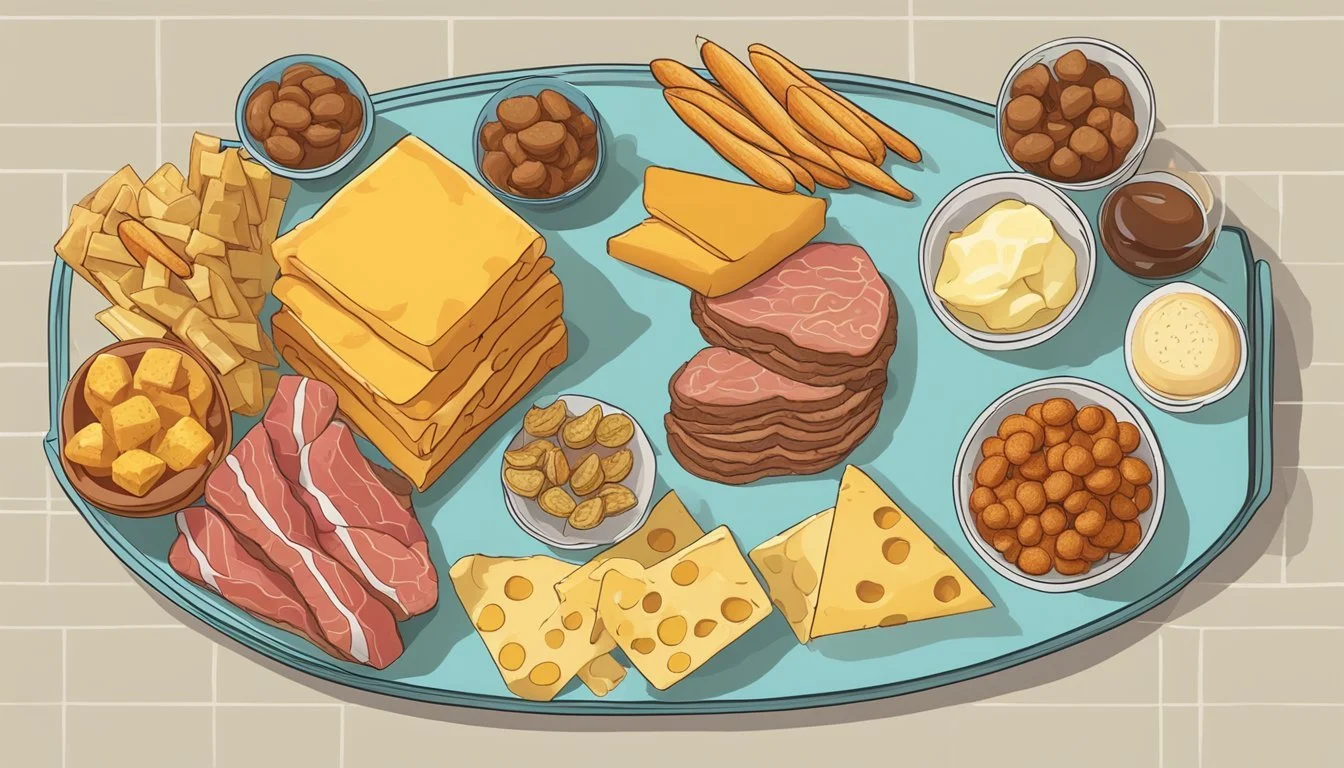Foods That Increase Bad Cholesterol
A Nutritional Guide to Avoid
Certain foods are known to increase levels of bad cholesterol in the bloodstream, which can lead to various health issues such as cardiovascular disease. Bad cholesterol, known scientifically as low-density lipoprotein (LDL), can build up in the walls of your arteries, creating blockages that impede normal blood flow.
Understanding which foods contribute to higher LDL cholesterol levels is essential for maintaining a healthy diet. Dietary choices play a crucial role in managing cholesterol levels, making it important to be aware of and avoid foods that are high in saturated fats and trans fats, contributing significantly to the problem.
1) Fried Chicken
Fried chicken is a popular dish, but it can significantly increase bad cholesterol levels. When chicken is fried, it absorbs a substantial amount of the oil it's cooked in. This process increases the saturated fat content, which is known to raise LDL cholesterol—the "bad" cholesterol.
The breading on fried chicken adds to its cholesterol-raising potential. Breading often contains refined carbohydrates and additional fats. These elements can contribute to higher cholesterol levels and worse heart health.
Many fried chicken recipes also involve the skin. Chicken skin is high in saturated fat, further contributing to elevated LDL cholesterol. Removing the skin before cooking can help reduce this risk but does not entirely eliminate it.
Using oils high in trans fats or repeatedly heating oil can also increase the unhealthy fat content in fried chicken. These fats are particularly harmful to heart health and can significantly raise LDL cholesterol levels.
Fried chicken's taste and popularity mean it remains a staple in many diets. However, those concerned about their cholesterol levels should consider healthier cooking methods, such as grilling or baking, and limit their intake of fried foods.
2) Bacon
Bacon is a popular breakfast item, but it can significantly contribute to high levels of bad cholesterol (LDL).
A serving of two slices of bacon contains about 10-15 mg of cholesterol and approximately 7 grams of fat, much of which is saturated fat. Saturated fats are known to increase LDL cholesterol levels in the bloodstream.
Processed meats like bacon also often contain additives and preservatives, which may have additional health impacts. It is advised to consume these types of meats in moderation or look for healthier alternatives.
For individuals with high cholesterol, limiting or avoiding bacon can be crucial for maintaining heart health. Reducing the intake of foods high in saturated fats is recommended to manage LDL cholesterol levels effectively.
3) Full-Fat Cheese
Full-fat cheeses such as cheddar, American, Swiss, and mozzarella are popular among many. These cheeses are high in saturated fats, which can raise LDL (low-density lipoprotein) cholesterol levels, often referred to as "bad" cholesterol.
Saturated fats in full-fat cheese can contribute to plaque buildup in arteries. This can increase the risk of cardiovascular diseases over time.
Not all types of cheese have the same impact on cholesterol levels. Some research suggests that the fermentation process in certain cheeses might not affect cholesterol as negatively.
Moderation is key when consuming full-fat cheese. Combining cheese with a balanced diet that includes fruits, vegetables, and whole grains can help maintain heart health.
4) Butter
Butter is rich in saturated fat, which is known to raise levels of low-density lipoprotein (LDL) cholesterol. LDL cholesterol is often referred to as "bad" cholesterol because elevated levels can lead to the buildup of fatty deposits in arteries.
A significant portion of the fat in butter is saturated. It has been linked to higher cholesterol levels. Eating butter regularly can contribute to cardiovascular issues if consumed in large quantities.
Health experts often advise people with high cholesterol to limit their butter intake. This is due to its potential impact on cholesterol levels.
Switching to healthier fat options, like olive oil or avocado, can be beneficial. They provide monounsaturated fats that may help lower LDL cholesterol levels.
While butter can add flavor and richness to meals, moderation is key for those managing cholesterol levels.
5) Pastries
Pastries are a significant source of bad cholesterol, primarily due to their high content of saturated fats. Ingredients such as butter, cream, and shortening contribute to the elevated levels of LDL (low-density lipoprotein) cholesterol.
These ingredients increase the risk of plaque buildup in the arteries.
Many pastries also contain trans fats, which are even more detrimental to heart health. Trans fats are often found in commercially baked goods to enhance shelf life and texture.
Consuming these fats can lead to higher LDL cholesterol levels.
Pastries are typically high in refined sugars. Excessive sugar intake can result in weight gain, which is another risk factor for high LDL cholesterol. Keeping these elements in mind, it is advisable to limit the consumption of pastries to maintain healthy cholesterol levels.
6) Margarine
Margarine is a popular alternative to butter, often chosen for its lower saturated fat content. It is primarily made from vegetable oils, which contain unsaturated fats. These unsaturated fats are generally considered more heart-healthy compared to the saturated fats found in butter, which are derived from animal products.
However, many types of margarine undergo a process called hydrogenation. This process transforms the liquid vegetable oils into a solid form, creating trans fats. Trans fats are known to raise LDL (bad) cholesterol levels and lower HDL (good) cholesterol levels, increasing the risk of heart disease.
Not all margarines are created equal. Some margarines are free from trans fats and instead contain plant sterols or stanols, which can actually help reduce cholesterol levels. It is crucial to check the labels and choose margarine that is labeled as trans fat-free and low in saturated fats.
While margarine can be a healthier alternative to butter if chosen carefully, it is important to be aware of the potential presence of trans fats. Regular consumption of margarine containing trans fats can negatively impact cholesterol levels and heart health. Always opt for soft or liquid margarine instead of stick forms, as they typically contain fewer trans fats.
7) Red Meat
Red meat includes beef, pork, and lamb. These meats are often high in saturated fat. Saturated fats are known to raise levels of LDL (bad) cholesterol in the blood.
Certain cuts of red meat contain more saturated fat than others. Examples include hamburger, ribs, pork chops, and roasts. Frequent consumption of these cuts can contribute to higher cholesterol levels.
Choosing leaner cuts can reduce the intake of saturated fats. Good options are 90% lean ground beef, sirloin, tenderloin, and pork tenderloin. These cuts have less fat and impact blood cholesterol to a lesser extent.
Portion control is also important. Eating smaller portions can help manage cholesterol intake from red meat. A recommended portion size is about 3 ounces per serving.
Despite the health concerns, red meat can still be part of a balanced diet if consumed in moderation. Balancing with plant-based proteins and incorporating lean cuts can help manage cholesterol levels effectively.
8) Commercial Baked Goods
Commercial baked goods, such as muffins, cookies, and cakes, are common culprits in raising bad cholesterol levels. These products are often made with ingredients like butter, sugar, and refined flour which are known to negatively impact heart health.
Many commercial baked items contain saturated fats and trans fats. Saturated fats raise low-density lipoprotein (LDL) cholesterol levels, which can contribute to artery blockage. Trans fats, found in partially hydrogenated oils, are particularly harmful and are linked to increased risks of heart disease.
Flour tortillas sold in stores may also fall under this category. They often include palm oil, which is high in saturated fats and can increase LDL cholesterol. This is an example of how commercial baked goods disguise themselves as benign when they can actually pose health risks.
Store-bought baked items are convenient but should be consumed with caution. Checking ingredient labels for saturated and trans fats can help in making healthier choices. Awareness of these ingredients can guide individuals towards better heart health by avoiding foods that contribute to high cholesterol.
9) Ice Cream
Ice cream is a popular dessert enjoyed by many, but it can be a significant contributor to increased levels of bad cholesterol, or LDL cholesterol.
This sweet treat is usually made from whole milk or heavy cream, both of which are sources of saturated fats. Saturated fats are known to raise LDL cholesterol in the bloodstream.
Additionally, some ice cream varieties contain added sugars and artificial ingredients, which can further affect overall health. Frequent consumption of these ingredients may lead to disruptions in lipid profiles.
For individuals managing cholesterol levels, it may be beneficial to limit the intake of ice cream. Opting for healthier alternatives, such as frozen yogurt or sorbets, can be a better choice.
10) Egg Yolks
Egg yolks are a well-known dietary source of cholesterol. One large egg yolk contains about 186 milligrams of cholesterol, which is a significant amount compared to other foods.
For those managing their cholesterol levels, this could be a concern as diets high in cholesterol can increase LDL (low-density lipoprotein), commonly known as "bad" cholesterol. Elevated LDL levels are linked to a higher risk of cardiovascular disease.
Although the impact of dietary cholesterol on blood cholesterol levels varies among individuals, those with certain health conditions or genetic predispositions might be more sensitive. These individuals might experience a more pronounced increase in cholesterol levels when consuming foods high in cholesterol, like egg yolks.
For people looking to limit cholesterol intake, using only the egg whites can be an option. Egg whites contain no cholesterol but still provide protein, making them a good alternative for those monitoring their cholesterol levels.
Several studies indicate that, for most people, consuming up to one whole egg daily does not significantly impact heart health. Nonetheless, it's essential to consider individual health profiles and consult healthcare professionals for personalized dietary advice.
Including egg yolks in a balanced diet, combined with other heart-healthy foods, can help manage cholesterol levels while still enjoying the nutritional benefits of eggs.
Understanding Bad Cholesterol
Bad cholesterol, often referred to as LDL (low-density lipoprotein), can have significant impacts on cardiovascular health. It's important to identify what bad cholesterol is and recognize the health risks associated with elevated levels.
What is Bad Cholesterol?
Bad cholesterol, or LDL, is a type of lipoprotein that carries cholesterol to your cells. Your body needs some cholesterol for vital functions, but excessive LDL can lead to health issues. LDL cholesterol can build up in the walls of your arteries, forming plaques. These plaques narrow the arteries, reducing blood flow and increasing the risk of heart diseases.
Health Risks of Elevated Bad Cholesterol Levels
High levels of LDL cholesterol can lead to several serious health conditions. It plays a critical role in the formation of atherosclerosis, where arteries become hardened and narrowed. This condition can elevate the risk of heart attacks, strokes, and peripheral artery disease. Monitoring and managing LDL cholesterol levels through diet, exercise, and medication is essential to maintain cardiovascular health.
Mechanisms of Cholesterol Increase
Increasing levels of bad cholesterol (LDL) in the bloodstream can be attributed to various dietary choices and nutrient intakes. This section delves into how certain foods and fats contribute to rising cholesterol levels and ultimately affect heart health.
How Certain Foods Affect Cholesterol Levels
Certain foods play a significant role in raising LDL cholesterol. For example, foods high in soluble fiber such as oatmeal and apples can lower LDL by reducing its absorption into the bloodstream. Conversely, processed foods, packed with cholesterol and fats, can elevate LDL levels.
Excessive intake of red meat, full-fat dairy products, and egg yolks introduces high amounts of dietary cholesterol to the body. Though the liver regulates cholesterol production, overconsumption of these foods overwhelms the body's ability to maintain optimal levels. This imbalance promotes the buildup of LDL cholesterol.
Highly processed foods often contain added sugars and refined carbohydrates, which can also increase LDL cholesterol indirectly. These foods can lead to weight gain and increase triglycerides, further compounding the problem by simultaneously lowering good cholesterol (HDL) levels.
Role of Saturated and Trans Fats
Saturated fats are a major contributor to raised LDL cholesterol levels. Found in foods like butter, cheese, and fatty cuts of meat, these fats increase cholesterol production in the liver. Consuming high amounts of saturated fats directly correlates with higher LDL levels in the blood.
Trans fats, often present in partially hydrogenated oils used in many fried and baked goods, pose a dual threat. They not only increase LDL cholesterol but also decrease HDL cholesterol, exacerbating cardiovascular risks. Trans fats have been largely phased out due to their adverse health effects, but they can still be found in some processed snacks and margarine.
To reduce these impacts, replacing saturated and trans fats with unsaturated fats from sources like olive oil, nuts, and avocados can help maintain healthier cholesterol levels. This substitution helps in balancing lipid profiles, reducing LDL, and raising HDL cholesterol.







